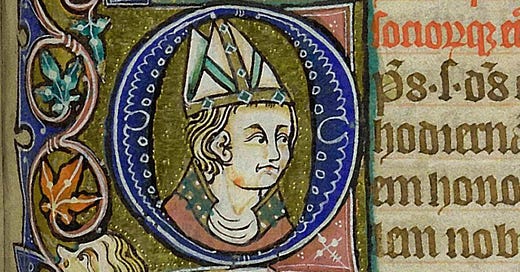Reinventing Education: The Good Example of St. Swithin
Small faithfulness in education that became great
St. Swithin (or Swithun) is a much beloved saint in the English church. His holiday was this past Saturday. He is probably most well known for a certain legendary weather forecast not of his doing. As told by Fr. Gregory Wilcox of St. Joseph Anglican, New Braunfels:
Swithin died, the most beloved of Winchester’s bishops, on July 2, 862. On his deathbed, he left instructions that his body should be buried outdoors and not in the cathedral. He wanted people to walk over his grave and the rain he so much loved to fall upon it. 100 years later Swithin’s body was removed from its simple grave and interred in the cathedral on July 15, 971 (which is observed as the day of his feast). On the same day his bones were moved from the outdoors an extraordinary rainfall began. This is responsible for the legend associated with St Swithin and rain; a weather proverb, which says that if it rains on St Swithin’s Day (July 15), it will rain 40 more days:
“St Swithun’s day if thou dost rain/
For forty days it will remain/
St Swithun’s day if thou be fair/
For forty days ‘twill rain nae mare.”
But I wish to focus on something not well known about Swithin — or at least I did not know it until Fr. Gregory educated me. This is very relevant to my post earlier this week on the need for alternatives in higher education.
Swithin had a special interest in furthering education in and around Winchester where he served the Wessex royal court. He made sure that parish schools were funded. He also funded promising students to study abroad. The Wessex royal family greatly trusted him; so he was entrusted with tutoring the sons of two kings.
One of those sons was Prince Alfred. He accompanied Alfred on a trip to Rome (probably the only time Swithin travelled across the Channel). Although Swithin was appalled by the pomp and corruption in Rome, young Alfred must have been struck by the churches, schools, art and libraries. He surely realized that Wessex had fallen far behind in learning and culture. Both during the long trip and back home, Swithin taught Alfred well and instilled in him a love of learning.
Yes, this is that Alfred, who became Alfred the Great. After defeating the Vikings, he, deploring what the predations of the Vikings and long years of war had done to learning in Britain, led a revival in scholarship. And he wanted learning to be not just the property of elite scholars. So he himself translated a number of works from Latin into English. He also established a court school open to those not in the nobility.
Alfred’s reputation for promoting learning became so great that later a legend arose that he founded the University of Oxford. Of course, that august university began more organically around 1100, centuries after Alfred. But that did not keep the legend from being regarded as historic fact at Oxford at least into the 18th century.
Swithin did not live to see his student make such a great impact. He died before Alfred became king. But what a difference Swithin and Alfred made!
St. Swithin provides us a good example that faithfulness in education on a small scale can eventually have a great impact. As I’ve posted before, don’t be discouraged if your efforts in education are small and even remain small. If you are faithful and persist, you have no idea how God may use that even well beyond your lifetime.
And sometimes…
Reinventing Education – Smaller Can Be Better
Yesterday, I greatly enjoyed going over to First Things to read “How to be on the Right Side of History” from James Hankins. It is an engaging take on different views of what constitutes “the right side of history” or even if such a thing exists. This amateur historian loved it.
smaller really is better.




Thanks, Mark, for the history lesson. St. Swithin, by being faithful in the little task Christ had given him to walk in transformed a culture. Amazing story. Thanks for the vision that faithfulness in small things can make a big difference.
So many good stories. I feel a bit 'robbed' by my history of Western education instructor in graduate school at Marquette (where I earned a M.Ed. in educational foundations) who either didn't know these stories or didn't share them.